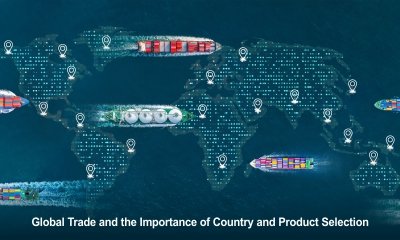In global trade, selecting the right country and product is crucial for success. Strategic choices in these areas drive market entry, profitability, and growth. This blog explores the importance of country and product selection in optimizing trade operations and achieving sustainable success.
1. Assessing Market Demand Opportunities Identifying markets with strong demand for your products ensures successful trade ventures. By studying market trends and consumer preferences, businesses can pinpoint high-potential regions. Understanding local needs allows companies to tailor their offerings, resulting in higher sales and better market penetration.
2. Evaluating Economic Stability Economic conditions in potential countries directly affect trade viability. Nations with stable economies, low inflation, and strong growth prospects offer favorable conditions for international business. A solid economic environment lowers financial risks and provides long-term stability for trade operations.
3. Considering Regulatory Environment Understanding the regulatory landscape of target countries is essential to smooth trade execution. Some countries have strict customs regulations, tariffs, or product-specific certifications that need to be met. By ensuring compliance with these regulations, businesses can avoid delays, fines, or shipment rejections.
4. Identifying Competitive Advantage Choosing countries and products where your offerings have a competitive edge is crucial. Analyzing the competition in each region helps identify gaps in the market, which can be exploited. Whether it’s through product differentiation or better pricing, leveraging a competitive advantage helps in securing market share.
5. Leveraging Trade Agreements Trade agreements and free trade zones between countries reduce tariffs and facilitate smoother operations. Selecting countries with favorable agreements improves the profitability and efficiency of trade. These agreements can significantly lower costs and ease entry into new markets.
In conclusion, Country and product selection plays a fundamental role in the success of global trade. By assessing market demand, economic stability, and regulations, businesses can make informed decisions that boost profitability. Identifying competitive advantages and leveraging trade agreements further enhances global opportunities. With a strategic approach, businesses can expand and thrive in the competitive global marketplace.
1. Assessing Market Demand Opportunities Identifying markets with strong demand for your products ensures successful trade ventures. By studying market trends and consumer preferences, businesses can pinpoint high-potential regions. Understanding local needs allows companies to tailor their offerings, resulting in higher sales and better market penetration.
2. Evaluating Economic Stability Economic conditions in potential countries directly affect trade viability. Nations with stable economies, low inflation, and strong growth prospects offer favorable conditions for international business. A solid economic environment lowers financial risks and provides long-term stability for trade operations.
3. Considering Regulatory Environment Understanding the regulatory landscape of target countries is essential to smooth trade execution. Some countries have strict customs regulations, tariffs, or product-specific certifications that need to be met. By ensuring compliance with these regulations, businesses can avoid delays, fines, or shipment rejections.
4. Identifying Competitive Advantage Choosing countries and products where your offerings have a competitive edge is crucial. Analyzing the competition in each region helps identify gaps in the market, which can be exploited. Whether it’s through product differentiation or better pricing, leveraging a competitive advantage helps in securing market share.
5. Leveraging Trade Agreements Trade agreements and free trade zones between countries reduce tariffs and facilitate smoother operations. Selecting countries with favorable agreements improves the profitability and efficiency of trade. These agreements can significantly lower costs and ease entry into new markets.
In conclusion, Country and product selection plays a fundamental role in the success of global trade. By assessing market demand, economic stability, and regulations, businesses can make informed decisions that boost profitability. Identifying competitive advantages and leveraging trade agreements further enhances global opportunities. With a strategic approach, businesses can expand and thrive in the competitive global marketplace.


